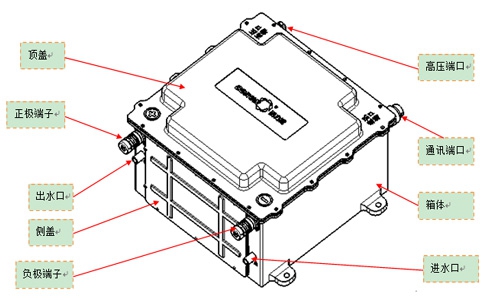Welcome to Fujian Weidong New Energy Co., Ltd
Tel:+86 597 5680903/+86 18059788355 E-mail: sales@chinahev.cn


Why do new energy vehicles favor nickel-metal hydride batteries?
- Categories:Industry News
- Author:
- Origin:
- Time of issue:2020-04-03 14:15
- Views:
Why do new energy vehicles favor nickel-metal hydride batteries?
(Summary description)With the increasing development of new energy vehicles, the battery safety technology of new energy vehicles has also received more and more attention and attention from everyone...
- Categories:Industry News
- Author:
- Origin:
- Time of issue:2020-04-03 14:15
- Views:
With the increasing development of new energy vehicles, the battery safety technology of new energy vehicles has also received more and more attention and attention from everyone. In fact, the two most important indicators when considering automotive power batteries are safety and cost. There are roughly three types of batteries currently used in hybrid buses: lead-acid batteries, nickel-metal hydride batteries, and lithium batteries. Lead-acid batteries are heavy in weight, cannot be quickly charged and deep-discharged, and have a short cycle life. Lithium-ion batteries have high current performance and are expensive, but they have safety issues. Well, nickel-hydrogen batteries are the first choice for hybrid buses. Let's take a look at the specific advantages of Ni-MH batteries:

New Energy Vehicle Ni-MH Battery
1.Ni-MH battery is safe and reliable
1) Nickel-hydrogen battery electrolyte is a non-flammable aqueous solution
Nickel-metal hydride batteries have a relatively high specific heat capacity, a relatively high heat of evaporation of the electrolyte, and a relatively low energy density. Even in the case of extreme abnormalities such as short circuits and punctures, the battery temperature rise is small and will not burn.
2) The difficulty of product quality control of nickel-metal hydride batteries is relatively low, and the possibility of defects caused by the manufacturing process is low.
3) As of the end of 2014, the proportion of hybrid vehicles with nickel-metal hydride batteries was as high as 73%. There are more than 8 million gasoline-electric hybrid vehicles equipped with hydrogen batteries worldwide. Most Toyota hybrid vehicles use hydrogen batteries. During the operation of more than 8 million vehicles in the year, there have never been serious safety accidents. Toyota's Prius, a representative of commercial hybrid vehicles, uses a special charge-discharge program to ensure that the battery's charge-discharge life is sufficient for ten years of use. Nickel-metal hydride battery is not only the most mature and commercially applicable battery among the three major systems currently recognized, but also the currently recognized first choice for hybrid vehicles. Other hybrid vehicles using NiMH batteries include:
Ford's Ford Escape; Chevrolet Malibu for Chevrolet; Honda Civic Hybrid for Honda
2.Ni-MH battery has good fast charging performance
3.Ni-MH battery has good low temperature performance
(1) Low temperature discharge
Nickel-metal hydride batteries use alkaline electrolyte aqueous solution, which can be discharged at a minimum of -40 ° C and 2C ~ 3 at -20 ° C. Lithium-ion batteries use organic electrolyte solutions. The resistance rapidly increases at low temperatures, and the performance at 0C has greatly deteriorated. Normal use at 10 ℃.
(2) Low temperature charging
Low-temperature fast-charge nickel-metal hydride batteries can be charged at a minimum of -40 ℃, 1C fast charging above -30 ℃, 3C or 2C fast charging above -20 ℃.
Lithium-ion batteries cannot be recharged at -5 ° C, otherwise they may cause safety risks.
4.Ni-MH battery has good environmental protection and recyclability
Nickel-metal hydride batteries do not contain highly toxic substances. The main components are nickel and rare earth. The recycling value is high (there is residual value), the recycling difficulty is small, and all can be recycled and reused for sustainable development.
Compared with lead-acid batteries, nickel-metal hydride batteries have a greater energy density ratio, which means that the use of nickel-metal hydride batteries can effectively extend the vehicle's travel time without adding extra weight to new energy vehicles. Second, the discharge characteristics of nickel-metal hydride batteries are smooth, the discharge curve is very smooth, and the amount of heat generated is small. These are the advantages of nickel-metal hydride batteries, and also the basis for new energy vehicles to use them as batteries. His disadvantage is that the energy density is relatively low, which is slightly heavier on the same power and weight, but this is acceptable in hybrid cars.
At present, battery technology is still the core bottleneck of pure electric vehicles. The stability of lithium batteries is not enough. Many batteries have a rapid decline in performance after a period of use. The batteries need to be replaced, and the price of the battery itself is high. At the same time, battery safety is also of great concern to consumers. The explosion of pure electric vehicle batteries has repeatedly occurred, which has greatly reduced consumer safety.
Although nickel-metal hydride batteries are heavier than lithium-ion batteries, some pure battery-powered vehicles still use nickel-metal hydride batteries, such as:
GM's Honda Civic Hybrid, Honda's Honda EVPlus, and Ford's Ford Ranger EV are the most difficult questions to answer about the life of the NiMH battery packs used in hybrid vehicles. Below we will use a large number of users to use it, and use time to prove it is the most convincing. The US "Consumer Report" followed a survey of more than 36,000 Prius owners, and the feedback concluded that it is very reliable and the cost of use is very low. "Consumer Report" uses a first-generation Prius that has traveled 330,000 kilometers for 10 years and a new-generation Prius that only traveled 3200 kilometers a decade ago for the same standard test comparison. The fuel consumption test was developed using the "Consumer Report" The test cycle and performance test link comprehensively tested the acceleration performance in various situations. The test results show that the old and new cars that have traveled 330,000 kilometers for 10 years have remained at the same level in terms of fuel consumption and power performance, indicating that the nickel-hydrogen battery pack and hybrid system are still working normally. It is worth mentioning that even if the first-generation Prius is used for 10 years and 330,000 kilometers, the nickel-metal hydride battery pack has never been replaced, and people have questioned that the situation that the capacity attenuation will greatly affect fuel consumption and power performance has not appeared.
Copyright © Fujian Weidong New Energy Co., Ltd




